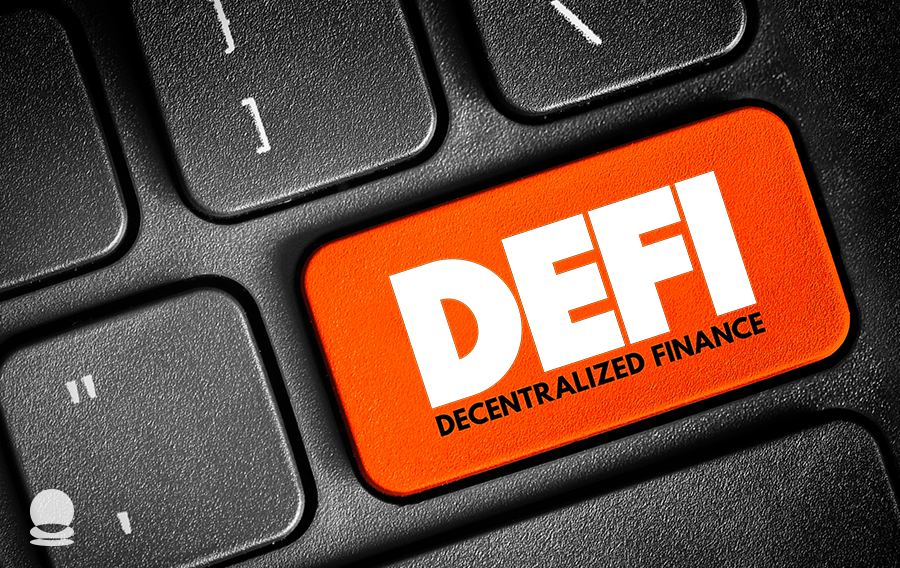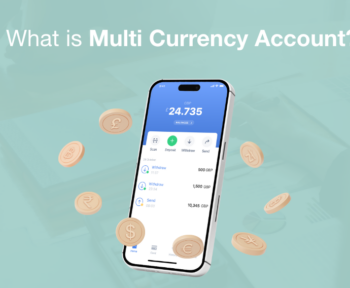The last few years have shown a dramatic increase in public interest towards decentralized finance, which most people refer to as “DeFi.” The term DeFi describes blockchain-based financial services that operate without any central intermediary.
Through blockchain technology and smart contracts, DeFi platforms provide users with the ability to manage financial transactions, including borrowing and lending cryptocurrencies as well as trading them, without depending on traditional centralized financial institutions.
The crypto world has been swept up by the rapid growth of decentralized finance. The DeFi sector remains somewhat specialized, but it has seen exponential growth in its diversity of applications along with the total value locked.
What factors have caused DeFi’s rapid ascent in popularity? Join us in this blog as we examine the primary drivers of DeFi‘s rising popularity alongside its various application types while highlighting the remaining risks and challenges that need attention.
After reading this, you will understand DeFi’s principles and its recognition as a trustworthy substitute for conventional financial services. Let’s start to explore in depth!
What is DeFi for Beginners?
Understanding DeFi presents challenges for those who are unfamiliar with the concept. The DeFi system intends to revolutionize traditional finance by eliminating centralized institutions such as banks and exchanges to enable direct peer-to-peer transactions without intermediaries.
Blockchain technology and smart contracts serve as the main building blocks for DeFi platforms, which create financial applications without centralized control points or single failure points. Users now possess enhanced control over their financial assets and transactions.
Core Concepts of DeFi
DeFi functions based on several fundamental concepts.
- Blockchain technology: Public blockchains power all DeFi applications, with Ethereum being the most crucial decentralized ledger system among them. This provides transparency and security for transactions.
- Smart contracts: Code-written contracts that execute automatically when embedded in blockchain transactions. Smart contracts provide the functionality for self-governing transactions that operate without needing intermediaries.
- Open-source code: DeFi protocols function as open-source projects, which enable users to audit their code and base new developments upon current work. This fosters innovation.
- Decentralization: No single entity controls the network. Participants use consensus mechanisms to reach collective decisions in DeFi systems.
- Non-custodial: Users retain full control over their private keys and digital assets without any intermediaries. The system does not retain funds through a centralized organization.
How DeFi Differs from Traditional Finance
Multiple key aspects of traditional finance are targeted for disruption by DeFi.
- Accessibility: People can use DeFi services anytime by simply connecting to the internet without facing obstacles such as credit checks or minimum balances.
- Transparency: Public blockchains record transactions, which enables real-time activity monitoring and protocol rule verification by anyone.
- User Control: Users maintain control over their private keys and funds, enabling them to transfer assets freely without any limitations.
- 24/7 Availability: DeFi services operate around the clock because blockchain systems run continuously, which allows people to access these services from any location worldwide.
- Programmable Money: Through embedded transaction rules, smart contracts create innovative financial product options.
Unlike centralized TradFi systems, which operate with closed-source code, DeFi platforms pursue inclusivity and transparency through their decentralized open-source protocols.
What Are the Key Advantages of DeFi?
Main benefits that have propelled DeFi’s popularity encompass:
Accessibility
DeFi stands out as it allows complete access to anyone who has internet access. Traditional banking requirements based on credit history, nationality, and minimum balance standards do not apply to this service.
The open and inclusive environment of decentralized finance has succeeded in drawing a new group of users who desire greater financial freedom and control.
Transparency
The nature of public blockchains ensures complete transparency for all transactions, which enables clear visibility into the operations of DeFi protocols and their utilization of funds.
Users have real-time access to their balances and transaction activities without requiring trust in centralized authorities. The transparent visibility available in DeFi protocols has strengthened users’ confidence in this emerging space.
User Control
DeFi provides users with the power to maintain possession of their digital assets plus private keys, enabling them full control over their financial resources.
Users operate without banks or intermediary limitations to access services and move their funds freely worldwide. A significant number of people find this level of autonomy very attractive.

What Are the Uses of DeFi?
DeFi has launched various pioneering financial applications that function similarly to standard bank services but operate without centralization.
- Lending/Borrowing: Users can lend and borrow crypto assets through platforms like Aave and Compound while earning interest on their transactions. Loans are automated via smart contracts.
- Stablecoins: Stablecoins reduce price fluctuations by anchoring their value to tangible assets like the US dollar. This eases crypto payments.
- Derivatives: Decentralized exchanges provide crypto derivatives, including options and futures that use smart contracts for settlement instead of relying on a central counterparty.
- Decentralized Exchanges: They enable decentralized trading of cryptocurrency assets through liquidity pools rather than traditional order books. Fees are cheaper than centralized alternatives.
- Insurance: They provide crypto insurance through smart contracts to protect users against hacks and losses. Premiums and payouts are handled autonomously.
- Decentralized Wallets: A non-custodial wallet gives users full access to the DeFi ecosystem while maintaining private key control.
While traditional finance persists, DeFi introduces new applications such as NFT trading platforms, prediction markets, and blockchain-based gaming. DeFi’s primary objective is to reconstruct the full spectrum of financial services through decentralized systems.
The benefits of an open financial system sound appealing, but DeFi users need to fully comprehend the technical and economic risks inherent in this experimental financial environment. Security threats can be reduced through interactions with established projects that have undergone thorough code audits alongside the implementation of hardware wallets.
Jeton offers a secure path for people who want to start exploring DeFi but worry about security risks or finding their way through different applications.
Jeton lets users store their money safely in its digital wallet and provides a built-in feature for trading major cryptocurrencies through simple clicks on its reliable platform.
Users benefit from Jeton’s instant transactions, and its prepaid Mastercard allows cash withdrawals at card-accepting locations.
The combination of Jeton’s affordable payment processing fees and its worldwide network makes it an easy option for both crypto purchases and international cash out of profits.
Additionally, Jeton offers cautious users a smooth transition into cryptocurrency and DeFi markets by combining traditional financial services with these modern platforms.
The platform’s strong reputation, along with its security measures and user-friendly interface, makes DeFi less daunting and safer for new users. Newcomers to the expanding area of digital finance can use Jeton as a secure entry point.
Who Benefits from DeFi?
DeFi platforms democratize access to financial services that only people with connections or wealth used to access. The elimination of financial intermediaries such as banks and brokers through DeFi enables users to benefit from reduced costs while accessing greater transparency.
This disintermediation allows anyone with an internet connection to secure crypto loans without needing credit evaluations or posting collateral. Crypto depositors generate interest for their deposits while borrowers access DeFi-based, DeFi security-enhanced lending rates.
Users can trade cryptocurrencies on decentralized platforms without facing extended verification requirements or withdrawal restrictions. Traders enjoy near-instant transactions and 24/7 access.
Generate returns on your crypto assets through liquidity provision pools. Liquidity providers earn passive income through trading fees that compensate them for their role in maintaining market stability.
Decentralized Finance (DeFi) creates equal opportunities in financial markets by eliminating entry obstacles. The permissionless nature of the system allows people and organizations from every corner of the planet to access a financial system that operates without restrictions.
The Role of Blockchain and Smart Contracts in Enabling DeFi Platforms
The fundamental technologies behind DeFi applications that enable decentralization stem from blockchain and smart contracts. Blockchain functions as a distributed public ledger that permanently records and transparently verifies all transactions without any intermediaries.
Smart contracts represent autonomous blockchain programs that execute themselves upon meeting specific predefined conditions.
They serve as the foundational elements of DeFi services by enabling the automated execution of financial operations such as lending, trading, and interest payments through predetermined agreements.
Smart contracts in lending automatically manage repayment processes and calculate interest based on the set duration of loans.
Exchange smart contracts enable buyers and sellers to trade crypto assets via peer-to-peer transactions, which are matched according to price thresholds established by traders.
DeFi protocols utilize blockchain technology to ensure transparency and smart contracts to automate processes, enabling the recreation of fundamental financial services.
These services are such as loans and trades without the need for trust-based systems or intermediary involvement. This approach reduces expenses and creates new paths for innovative developments in financial transactions and value exchange.
Popular DeFi Applications
We will now examine the leading applications currently used in the DeFi sector.
Crypto Lending
Some platforms let users earn interest on their cryptocurrency deposits by lending them to borrowers. Users can obtain crypto loans through collateralization of different cryptocurrencies while agreeing to repay both the principal and accumulated interest over time.
Crypto Borrowing
DeFi lending protocols enable users to access stablecoins as cash by pledging their digital assets as collateral. Users obtain short-term funding at reduced interest rates without having to liquidate their cryptocurrency investments.
Crypto Trading
Uniswap enables peer-to-peer spot trading of cryptocurrencies without traditional order books on decentralized exchanges. Traders deposit two coins into liquidity pools to accumulate fees while the pool enables asset swaps.
Yield Farming
Users gain yields through liquidity provisioning to automated market makers, which represents an advanced concept. Users who deposit assets receive both trading fees and new token incentives. Users benefit from substantial short-term earnings through fresh DeFi initiatives.
These foundational DeFi applications continue to develop while they already emulate essential financial activities through blockchain technology and showcase its disruptive potential for traditional finance.

Risks and Challenges of DeFi
DeFi’s quick expansion reveals specific risks that threaten user trust unless effective mitigation measures are implemented.
- Smart contract risks: DeFi remains exposed to hacks and fund losses because smart contract vulnerabilities exist whenever bugs appear in their underlying code. Regular audits are crucial.
- Custody risks: DeFi protocols lack deposit insurance, which is standard in traditional banking institutions. Users need to keep their own assets with safe private keys to avoid permanent loss from computer problems.
- Volatility risks: The construction of DeFi on highly volatile cryptocurrencies results in rapid collateral value decreases, which can trigger under-collateralized loans and eventual liquidations.
- Regulatory uncertainty: Many DeFi protocols lack clear legal status because they operate within ambiguous regulatory frameworks. Future policies could impact the ecosystem.
The successful management of these risks remains essential for decentralized finance to achieve sustainable expansion and widespread acceptance.
Protocols focus on strengthening security measures while offering insurance solutions and ensuring regulatory compliance through active engagement with authorities. Open permissionless systems such as DeFi will probably always contain some inherent risk levels.
Is Decentralized Finance the Future?
The $110 billion currently held within DeFi protocols demonstrates the substantial potential of this growing industry to redefine global financial systems. DeFi improves financial services by eliminating intermediaries and central authorities to provide enhanced transparency and efficiency and expand access.
Payment platforms such as Jeton facilitate cryptocurrency transactions, which boost the wider use of digital assets. Integrated digital wallets allow users to perform global cryptocurrency transactions, including buying, storing, sending, and spending.
Merchants using Jeton can gain advantages by accepting cryptocurrency payments, which come with reduced transaction fees. Traditional financial institutions will remain key for large institutions, but DeFi provides an attractive technological option for those who want greater financial independence.
The expansion of DeFi applications shows no sign of flagging as decentralized insurance and lending keep developing. As development efforts expand knowledge while enhancing security standards, public blockchains will power a decentralized financial ecosystem that looks increasingly promising for the future.
It is uncertain whether DeFi vs traditional finance will lead to full replacement or coexistence, but the DeFi popularity trend suggests a significant shift in the landscape. The permanence of DeFi stands beyond doubt, as it will significantly influence the direction of future financial systems.
Wrapping Up
Decentralized finance (DeFi) has achieved substantial growth due to its substantial benefits over traditional systems even though it remains an emerging technology. Financial inclusion together with transparency and autonomy, as well as open protocol innovation, strongly attracts users.
The advancement of DeFi will need to address present challenges related to security measures, scalability solutions, and regulatory frameworks.
The maturation of technology combined with better infrastructure enables DeFi to disrupt traditional finance by offering decentralized applications that empower people.
In this regard, Jeton offers a secure starting point for risk-aware individuals wanting to explore this financial revolution’s opportunities.
Visit our website to discover how our merchant solutions enable global acceptance of crypto and fiat currencies through Jeton with minimal fees. You can also download the Jeton App via Google Play Store or App Store.
Simple payment buttons make it possible to participate in the expanding DeFi movement, which advocates open access for everyone.
Ready to take control of your finances in the DeFi era? Jeton bridges the gap between traditional finance and the decentralized world—offering you secure, flexible, and user-friendly payment solutions.
Open your Jeton account today and be part of the financial future, on your terms!


